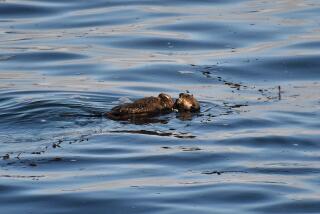Deep sea octopus mom tends her eggs longer than any animal on Earth
- Share via
Call it extreme parenting: Scientists announced the discovery of a deep sea octopus mom that faithfully guarded the same clutch of eggs for a record-breaking 4-1/2 years.
“This is the longest brooding or gestation of any animal on the planet,” said Brad Seibel, an animal physiologist at the University of Rhode Island.
“Elephants gestate for 20 to 21 months and some deep sea sharks carry their embryos around internally for a couple of years, but nothing is longer than this.”
The long brooding period represents the far end of an underwater parenting spectrum. On the opposite end lies the “broadcast spawn” strategy, when an animal releases hundreds of thousands of eggs into the water and hopes for the best. Most of those eggs and juvenilles get gobbled up by predators, but because there are so many of them, a few do make it to adulthood.
The deep-sea octopus Graneledone boreopacifica, on the other hand, produces a relatively small number of eggs (between 155 and 165), and then watches over them until the babies inside are well developed and, therefore, more likely to survive.
What makes this ocotopus’s herculean act of parenting all the more amazing is that during those 4-1/2 years that she is protecting her eggs, she does not appear to eat.
“I think she keeps them clean, keeps sediment from accumulating on them,” said Seibel. “Also, the oxygen level is fairly low down there, so she may ventilate the eggs by blowing water across them.”
But other than that, she just sits there. The lack of eating takes a toll on her health, of course. Her muscles atrophy. Her body gets smaller. Her color gets paler. And when her babies finally do hatch as fully developed, fairly substantial octopuses about 4 centimeters long each, the mom wastes away entirely. Her work is complete.
This lengthy brooding period was only discovered in the last few years when researchers from the Monterey Bay Aquarium Research Institute got lucky and located a Graneledone boreopacifica just weeks after she laid her eggs.
Their findings were published in a paper published Wednesday in PLOS One.
The research began in April 2007, when the team took a remotely operated vehicle (ROV) out for a spin in the Monterey Submarine Canyon and came across an isolated rocky outcropping on the ocean floor about 4,600 feet down.
Deep-sea octopuses need to find rocky slopes at the bottom of the ocean to which to attach their eggs, and scientists had seen octopuses guarding their eggs in this spot before. This time, however, the slope was octopus-free, although the researchers did notice an octopus moving over the sandy floor toward the hard surface.
When the ROV cruised past the same spot 38 days later the team saw the same octopus (identified by a tell-tale scar on the webbing between her legs) was perched on the rocks, guarding a clutch of eggs.
That meant the octopus had laid those eggs within the ROV’s last pass, and the research team now had the rare opportunity to measure the length of a Graneledone boreopacifica brooding period from its very beginning.
“The eggs are translucent, so when we first started watching we could see there were no apparent embryos in the eggs,” said Seibel, an author on the paper. “So we know we were probably within a few weeks of her laying those eggs.”
Over the next 4-1/2 years the ROV returned to the same spot 18 times -- about once every two months. They watched as the egg capsules more than doubled in size from 1.5 centimeters in length to 3.3 centimeters. In that time they never saw the mother leave her eggs, and they never saw her eat a morsel of food.
On their last visit in September 2011, they found the milky white oblong egg sacs torn and empty, and the mama octopus gone. (See images from their years of observing in the photo gallery above).
All species of octopus keep watch over their eggs, but the typical brooding time is usually closer to a few months, rather than several years. Because Graneledone boreopacifica lives in such a chilly environment where the water is about 35 degrees Fahrenheit, scientists anticipated that their metabolic activity and life cycle might be slowed down. However, they did not anticipate it would be slowed down so much.
“I was thinking because the eggs are so large and the temperature is so low they might brood for three years, but to have it be 4-1/2 years is just stunning,” said Janet Voight, a cephalapod specialist at the Field Museum in Chicago who was not involved with the study.
Part of what makes this study so surprising is that octopuses are in general are not very long lived creatures -- most of them have a life span of just two to three years.
“What we know about shallow water octopus is they grow really fast, hit sexual maturity and then go into senescence [old age] in what seems to us, a very short time,” said Voight. “So it is just amazing that this octopus can be so long lived.”
Although it is tempting to anthropomorphize this deep-sea octopus mom, to marvel at the maternal sacrifice that has her wasting away while she watches over her eggs until her death just after they hatch, Voight cautions against it.
“It is not just the female giving her all,” she said. “It is not a maternal thing. It is just that their lives are programmed to run fast and end early.”
If you are a fellow cephalopod lover, follow me @DeborahNetburn and “like” Los Angeles Times Science & Health on Facebook.







